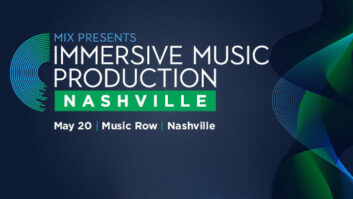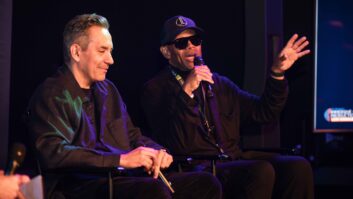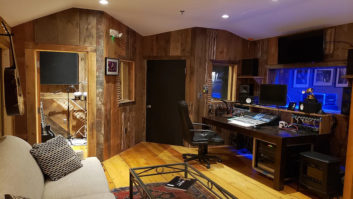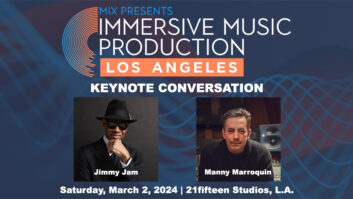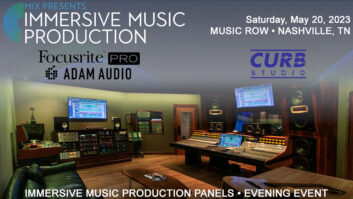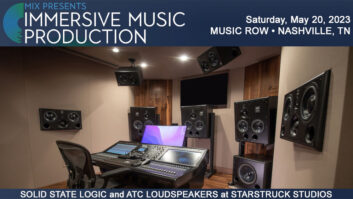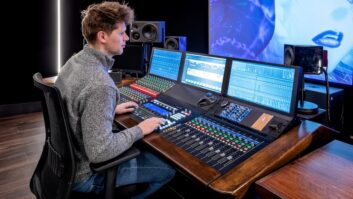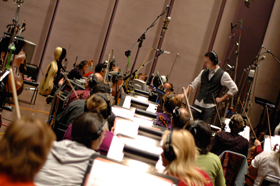
Jason Graves conducts an orchestra at Skywalker Sound.
If you grew up in the 1980s, then you can appreciate the mesmerizing power of Atari, Intellivision, and Sega. We may get it, but today’s generation looks at these games and equates them with the Flintstones, scratching their heads in pure bewilderment at how we could ever have been entertained by such rudimentary graphics and low-tech bleeps, crashes, and whirs. You really can’t blame them, because the videogames they have at their fingertips exhibit a wholly different level of sophistication. In many ways, they are much like mini-movies that contain complex graphics, authentic sounds, and custom musical compositions.
This month, I spoke with three of the nation’s top videogame composers: Jason Graves, Inon Zur, and Boris Salchow. Truth be told, when I prepared for my interviews, I didn’t expect my sources would have much to say about the differences between composing for games and other media. As it turns out, though, they did. And for them, the differences are precisely why they’ve carved a niche for themselves in the medium.
A Totally Different Game
If you’re a gamer, then you know just what an important part music plays in modern videogames. Just about every game created for the major systems contains a musical theme that sets the tone for the game, much like a soundtrack sets the tone for a film. But there is one big difference: “In the majority of films, it’s the dialog that drives the story, with the music playing a supporting role, but in videogames, the sound is front and center,” says Jason Graves, whose videogame credits as a composer include Prey 2, Command & Conquer: Tiberium Twilight, and Dead Space, to name just a few. “In games, there is dialog only about 10-percent of the time, so the music and sound effects are really drawing the player in and creating the setting—whether it’s happy, scary, exhilarating, or calm.”
Boris Salchow at Abbey Road Studios in London
The interactive aspect of videogames also makes them quite different from scoring for films and TV programs. “When writing game music, you have to consider how the player is going to interact with the game throughout its duration,” explains Boris Salchow, a German-born composer who now makes his home in Los Angeles, and whose credits include Resistance 3, Ratchet & Clank, and Tom Clancy’s Rainbow Six: Vegas 2. “The challenge is, you never know how long a player will be in one place, so as a composer, you have to make judgment calls and deliver chunks of music that are loopable and can be layered to accommodate the different options the player has.”
Because of these multiple options that are available to players, a composer must create multiple musical elements. For instance, whereas a chase scene in a movie will be written to perfectly fit as a 2- or 3-minute scene, in a game, a chase scene may last for anywhere from a minute to 20 minutes and beyond, depending on the player’s choices. So, the music has to be written to accommodate the varying levels of intensity experienced by the player.
Of course, that translates into big-time volume. In fact, oftentimes game composers are expected to deliver several hours’ worth of music for a project over a period of weeks or months. However, along with the required volume comes more room for creativity and flexibility, and more often than not, fewer higher-ups to impress.
Los Angeles–based composer Inon Zur
“You’re really not limited by any boundaries except those that you set yourself,” says Los Angeles–based Inon Zur, an award-winning composer whose game credits include The Lord of the Rings: War in the North, Dragon Age, and Fallout: New Vegas. “One of the things I love most about composing music for games is the challenge of creating something new and uncovering new ways to convey a story.”
For example, Zur says his work on the Fallout series demanded a great deal of originality because the music was not constrained to a particular style. “The producers were open-minded, which was great because that allowed me to let my imagination fly and compose music that was really out of the box.” For the project, Zur was able to incorporate rare instruments with a classical orchestra and electronic effects. “Just like you would with other media, you have to capture the emotions of the story, but you have greater freedom to do so.”
Greater creative freedom is possible in the gaming world because, generally speaking, there are fewer gatekeepers. “When I score for a videogame, there’s usually a creative director and maybe three other guys who are in decision-making roles,” says Salchow, “whereas when you do a commercial, there are about 15 people you’ve got to please. So even though I may only be writing 30 seconds of music, the project can be a more chaotic process overall.”
Speaking of the story: Unlike film composers who have a script in hand and a good understanding of how the story unfolds and ultimately ends, the trick for game composers is figuring out how to create music for a story that is, in large part, unwritten.
“With games, the developers can only show you what they’ve developed so far, so most of the time, you don’t have the full scope of the story when you begin a project,” says Salchow. This is because developers test their games as they are in development to obtain—and react to—the feedback they receive, which dictates the direction of the game. Salchow says this isn’t necessarily a bad thing for composers, since music for games is delivered in modules that aren’t synced to frames specifically, and sometimes a piece of music that is written for a situation that gets changed or cut can wind up working in another place in the game.
The Appeal
In fact, what proves appealing to composers and can edge out their desire to compose for other media is the creative freedom offered in composing for videogames.
“I had worked in L.A. for about three years as a composer when I realized it just wasn’t my cup of tea,” says Graves. “All I was doing was copying the temp tracks, and it just left a lot to be desired.” After moving back home to North Carolina in 2001 and taking on some corporate music and ad agency work, Graves was given an opportunity to work on music for the King Arthur videogame. “What slapped me in the face was that the 45 minutes’ worth of music I had to do in three weeks was all approved. It was the antitheses of spending hours and hours creating music for a 30-second commercial and being in the fourth round of revisions.”
Ten years later, Graves has composed for close to 100 videogame titles. “This suits me,” he says. “The more originality I can bring to a project as a composer, and the more identity I can bring to a score, the happier that makes the clients and me, so it’s a win-win.”
That was how Salchow felt about his work on Resistance 3. “It was one of the most interesting games I’ve been involved with because it highlighted human tragedy, which is non-typical for a videogame,” he says. In the sci-fi-esque story, the world is destroyed by aliens, but instead of the game highlighting the war and fighting, it focuses on loneliness, sadness, and misery. “For games, there’s usually a lot of action music, which can be exhausting to create, so writing melancholy music for this project was beautiful.”
It didn’t hurt that Salchow was able to record the project with the London Symphony Orchestra at Abbey Road Studios in London, either—a rare opportunity for many composers, but one that both Graves and Zur have also had the privilege of experiencing in their videogame work. (In addition to recording at Abbey Road, Graves conducted and recorded his live orchestral scores at Air Studios London, Capitol Records, Paramount Pictures, Skywalker Sound, and with the Seattle and Salt Lake City Philharmonic orchestras.) That’s because budgets and time frames for games often afford composers the luxury of capturing live, orchestral performances. The remainder of the time, these composers can enjoy creating from the comfort of their own studios.
Graves, for instance, works primarily from the 1,200-square-foot studio he recently built in his backyard, which is outfitted with five Mac Pros, two 30-inch Apple cinema displays, and Dynaudio M3As, Zur’s 800-square-foot studio is set up to accommodate just about any project that he lands. It features nine computers, Steinberg Cubase, Genelec 1080 monitors, and multiple libraries. “I have my studio set up so that I’ve got pretty much everything right at my fingertips,” says Zur. “Some of the projects I do don’t require orchestras, and when that’s the case, I’ve got the tools I need to create the right sounds.” Salchow’s streamlined studio features a Mac Pro running Cubase along with Pro Tools HD and a video player, and several computers on which he can create authentic orchestral sounds.
Prior to his foray into videogames, Zur enjoyed a very successful career as a film/TV composer, scoring such projects as Au Pair, Digimon, Power Rangers, and Escaflowne. He values the feedback he’s received from gamers who express how much they’ve appreciated the music he’s written. “I receive emails from players all around the world who tell me how much they’ve loved the music and how it’s helped them make a connection to the game,” Zur says. “Videogames really give you the opportunity as a composer to use music as a language, and when you hear that people connect to and understand what you’re trying to convey, it’s really gratifying.”
Graves finds gratification in the fact that he doesn’t feel like he’s working. “If I had a job as an insurance salesman by day, I’d still be doing what I’m doing for free every night of the week because I love it so much,” he says. “The fact that I get paid to do what I love to do is not only amazingly satisfying on a creative level, but it also keeps me happy.”
That’s precisely the way Salchow sees it: “It’s not only therapeutic, it’s just plain good for the soul.”
Lisa Horan is a writer with more than 19 years of industry experience, and the executive director of PopMark Media, a unique partnership that offers creative and marketing services, custom music and music production, and audio post-production services to music, film, and business clients.

